- June 29, 2023
How Much Do Boston Terriers Smell? Breed Characteristics & Care Tips
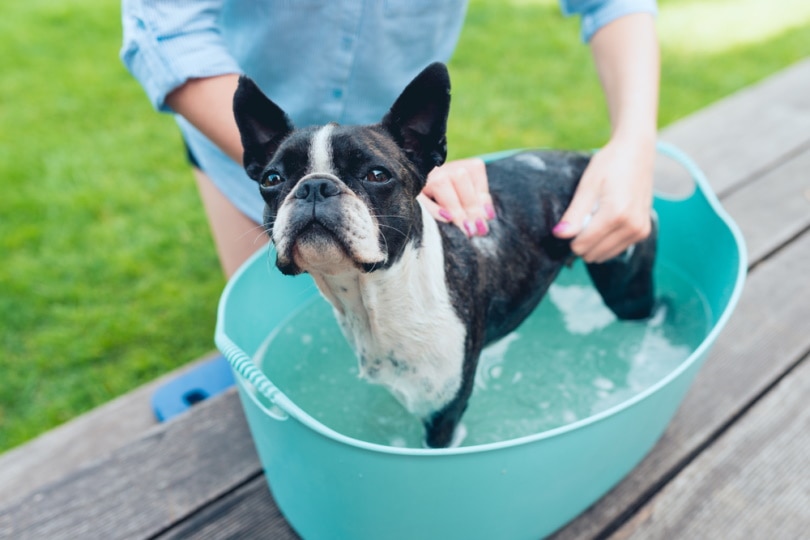
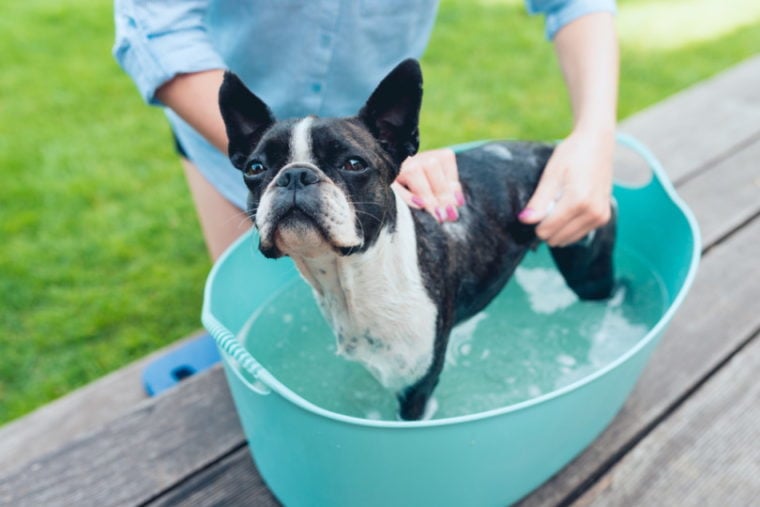
Are you looking to own a Boston Terrier and wonder whether they smell? Or are you concerned about your pets’ body odor?
Boston Terriers don’t generally smell. However, some owners have admitted to a strong odor characteristic of Fritos and corn chips coming from their dogs. But this is not the Boston Terrier’s natural scent and could indicate an underlying condition.
So how should they smell, and what causes unusual body odor? Read on.

How Much Do Boston Terriers Smell?
Boston Terriers are not smelly.
But they do have a distinct scent that is specific to the breed. The typical odor associated with Boston Terriers can be described as a musky or slightly “doggy” scent. This scent results from the natural oils produced by their skin and can vary slightly between individual dogs.
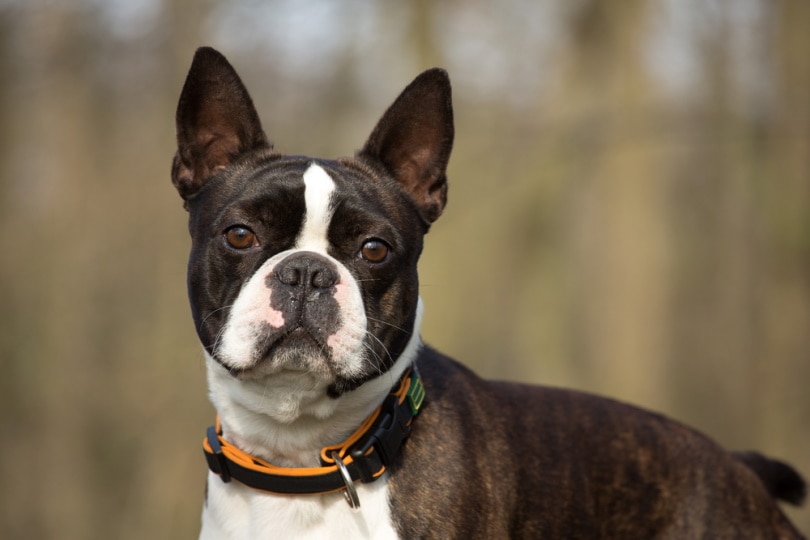
What Is Normal and What Isn’t?
Typical body odor in Boston Terriers is usually mild and shouldn’t be overly strong or unpleasant. You can quickly tell whether your dog is smelly when interacting with them. Usually, a foul smell is accompanied by other signs like itching, redness, or discharge.

What Causes Body Smell in Boston Terriers?
A well-kept Boston Terrier should have a mild scent, but other factors can lead to a strong body odor. It is important to understand why some Boston Terriers may have a stronger or more distinct smell than others so that you can take appropriate measures.
1. Genetics
Boston Terriers inherit certain genetic traits from their parents, including the potential for specific scent characteristics. Remember, individual dogs may vary in their scent. Therefore, certain genetic variations can make some individuals more prone to having a stronger or more noticeable natural odor than others.
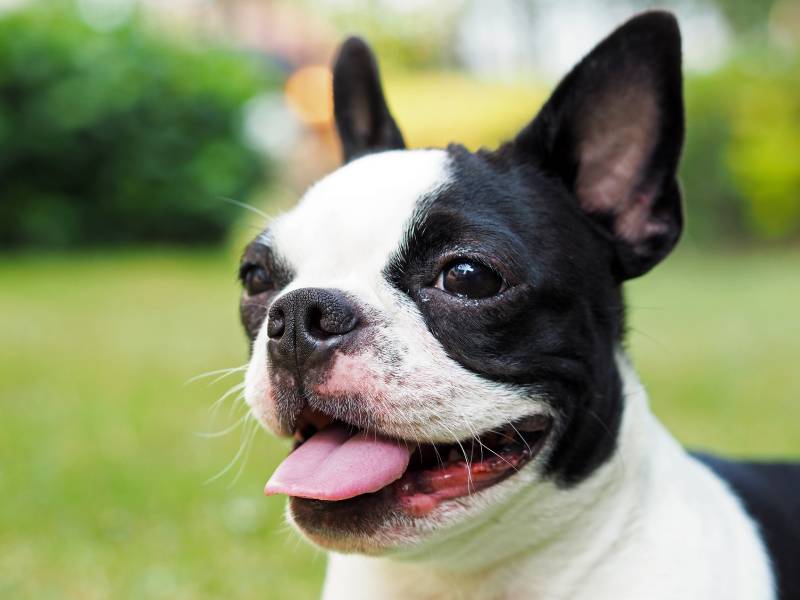
2. Diet
What you feed your Boston Terrier significantly affects its body odor.
Certain ingredients can contribute to an increase in odor, while others can help regulate it. For instance, foods high in fats or certain proteins can sometimes make your dog smellier. On the other hand, balanced diets with quality ingredients such as fish, poultry, and whole grains can help maintain a more natural scent.
3. Skin Health
The overall health of a Boston Terrier’s skin plays a crucial role in its smell. For example, you can expect significantly increased body odor if your dog has skin issues such as allergies, infections, or excessive oiliness.
4. Environmental Factors
Environmental factors can significantly impact the body odor of Boston Terriers. The surroundings in which they live and spend time can influence the intensity of their scent. For example, exposure to allergens, pollutants, or unclean living conditions may contribute to a stronger smell.
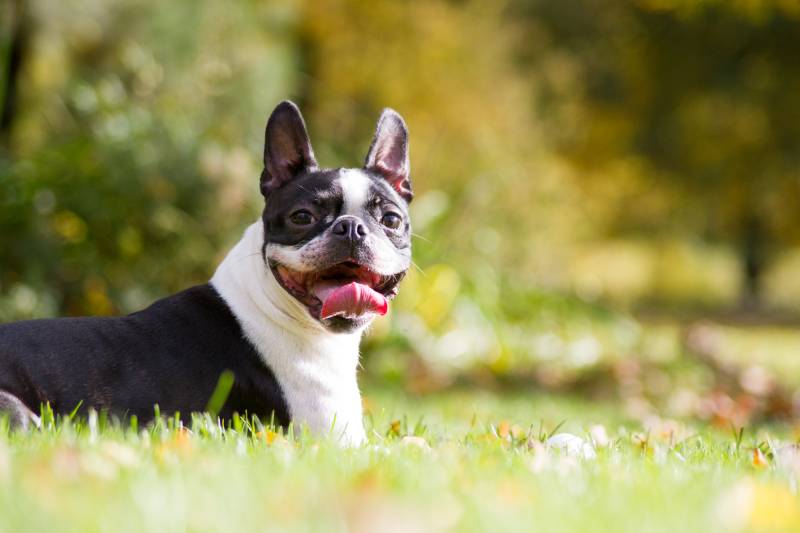
5. Health Conditions
Certain health conditions can contribute to a Boston Terrier’s body odor changes. Here are some health conditions to look out for when dealing with body smell.
Dental Issues
Poor oral hygiene, gum disease, or tooth decay cause bad breath. This, in turn, can contribute to unpleasant body smell. Regular dental care, brushing your dog’s teeth, and providing dental treats or toys, can help maintain their oral health and minimize odor-causing bacteria in the mouth.
Skin Infections
Skin infections resulting from allergies and excessive moisture can cause an unpleasant odor. Usually, these infections are caused by bacterial or fungal organisms on the dog’s skin.
Consult your veterinarian for a proper diagnosis and treatment. It is generally a bad idea to buy over-the-counter medication without guidance, as this can worsen the condition.
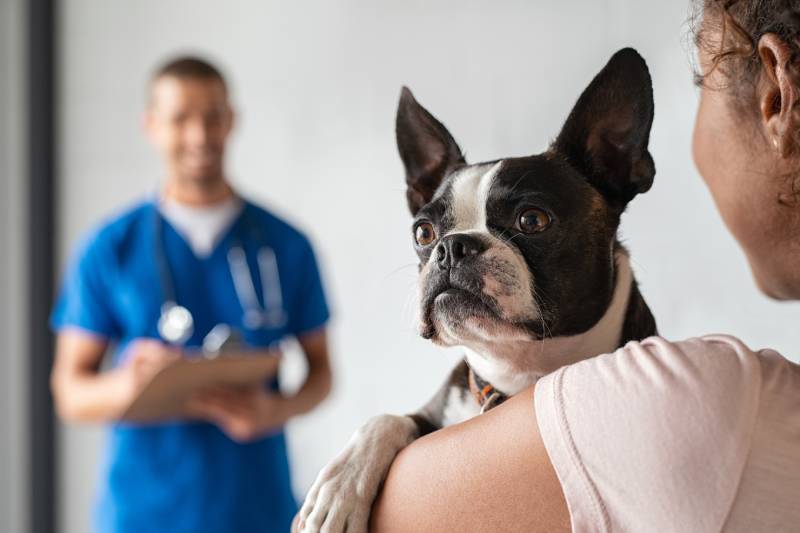
Ear Infections
Ear infections are common in dogs, including Boston Terriers, and can produce a foul smell. They are usually a result of moisture buildup, allergies, or ear mite infestations. To prevent this, adhere to a regular ear cleaning and examination routine.
Do not hesitate to consult a vet for appropriate treatment for your dog.
Yeast Infections
Yeast infections, particularly in the skin folds and ears, can contribute to a strong, musty odor. These infections are often a sign of yeast overgrowth due to factors like allergies, moisture, or underlying health conditions such as hormonal imbalances, allergies, and a weakened immune system.
You could treat yeast infections using antifungal medications and specialized shampoos. It’s also crucial to address any underlying causes of yeast buildup.
Regular veterinary check-ups, prompt treatment of any health issues, and adherence to recommended healthcare routines can help manage and minimize any odor-related concerns stemming from underlying health conditions.

How to Manage Body Odor in Boston Terriers
Managing body odor in Boston Terriers is essential to their overall well-being. The following are some things to consider.
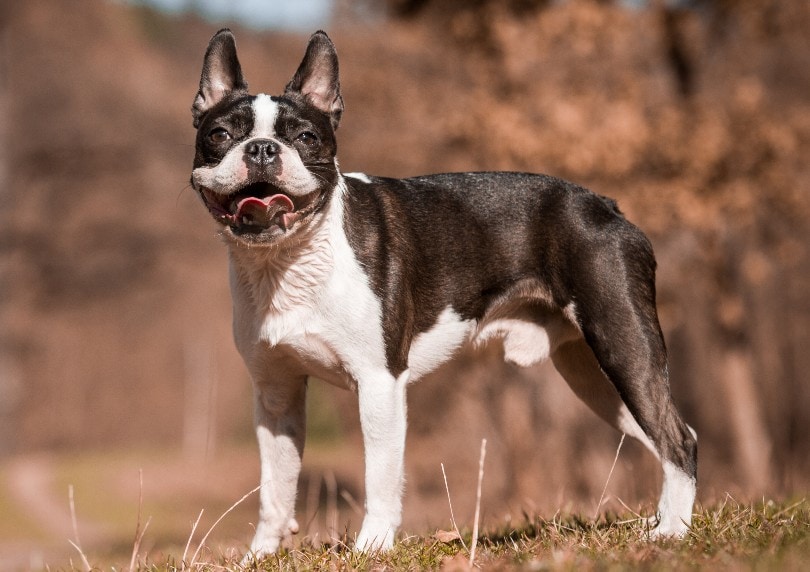
Maintaining Proper Hygiene
Maintaining proper hygiene for your dog is one of the best ways to manage body smell.
Ensure your Boston Terrier stays fresh and clean by bathing them regularly with the right shampoos. A good bath will easily remove dirt and excess oils. Additionally, brush their coat to remove loose hair and debris, clean their ears to prevent wax buildup, and provide regular dental care to maintain oral hygiene.
Provide Proper Diet
Considering that your dog’s food will influence their body odor, it helps to feed them high-quality and nutritionally balanced dog food.
Consider ingredients such as fish, poultry, and whole grains, as these can regulate body odor, and avoid excessive consumption of red meat or foods with artificial additives, as these can increase body smell.
Keep Their Environmental Clean
Creating a clean living environment for your Boston Terrier is essential in managing their smell. Regularly clean and vacuum their living areas to remove dirt, dander, and any potential odor sources
Also, regularly wash their bedding, blankets, and toys to eliminate lingering smells. Pay attention to areas where your dog spends the most time, such as their crate or favorite lounging spots, and ensure they are kept clean and fresh.
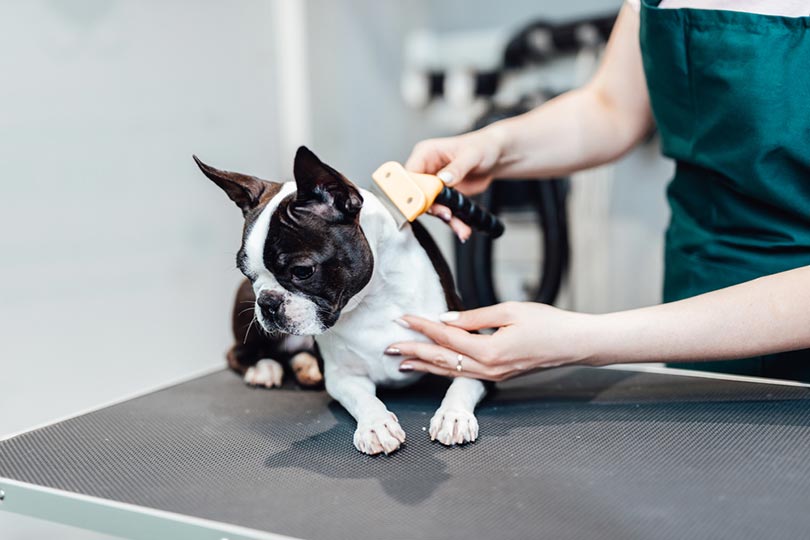
Explore Odor-neutralizing Products
You might also consider using odor-neutralizing products. For example, use pet-friendly sprays or wipes on their coats between baths. You could also use odor-neutralizing sprays for their bedding or designated areas in your home.
Additionally, regular washing of their food and water bowls and using odor-absorbing products like baking soda in their living space can help control unwanted stenches.

How to Keep Your Dog Healthy, Safe, and Happy
You can ensure your furry companion enjoys a fulfilling life free of offensive body odors by taking proper care of them. Consider the following.
Maintain a Regular Grooming Routine
Maintaining a regular grooming routine is essential for keeping your Boston Terrier healthy, comfortable, and happy.
For example, regular brushing helps remove loose hair, prevents matting, and promotes a healthy coat. Additionally, regularly trimming your dog’s nails prevents overgrowth and discomfort. Remember to clean their ears and brush their teeth to prevent infections and dental issues.
Vet Visits
A veterinarian is in the best position to provide essential preventive care, such as vaccinations, parasite control, and routine health screenings. They can also offer valuable guidance on nutrition, exercise, and any specific health concerns or conditions affecting your dog.
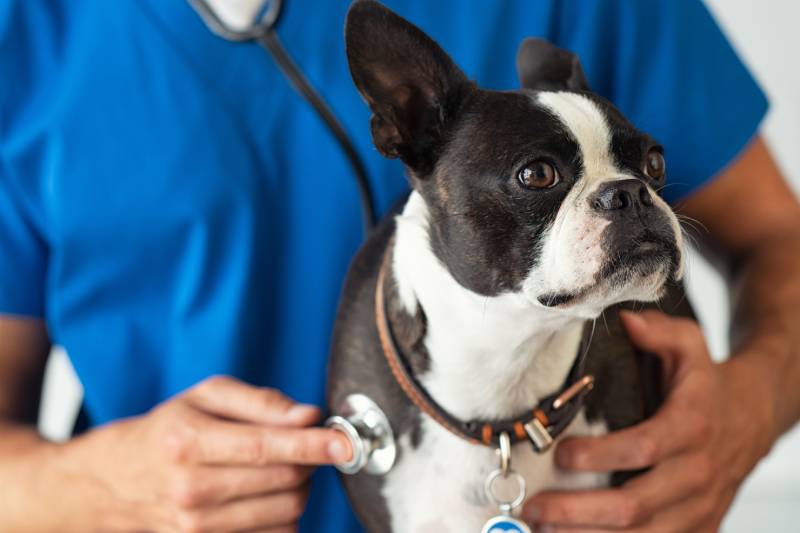
Create a Regular Exercise Routine
Establishing a regular exercise routine is crucial for your Boston Terrier’s health.
Physical activities help maintain weight and promote cardiovascular health, muscle strength, and mental stimulation. You could adopt a routine that includes daily playtime, walks, and interactive games that cater to their energy levels and abilities.
Additionally, consider incorporating activities that cater to their breed-specific traits, such as agility or obedience training.

Final Thoughts
Boston Terriers don’t generally smell outside the musky, doggy scent characteristic of most dogs. Maintaining regular grooming routines, providing a balanced and nutritious diet, keeping them clean, and addressing any underlying health conditions is an important part of dealing with bad odor.
If your dog has a particularly strong odor, they might have an underlying issue. Consult a vet for a diagnosis and treatment.
Featured Image credit: bubutu, Shutterstock
Tags
What do you think?
Related Articles

New Puppy Checklist: Gear You’ll Need for Your New Dog
Getting a new puppy is really exciting, but before you welcome them home, it’s important to prepare your space for them. Since puppies need a

How Big Do Mini Poodles Get? Vet Reviewed Average Weight & Growth Chart – Dogster
The information is current and up-to-date in accordance with the latest veterinarian research. Learn more » When you buy a Miniature Poodle, you might not

Can Police Dogs Smell Nicotine? Vet Verified Facts & Info – Dogster
The information is current and up-to-date in accordance with the latest veterinarian research. Learn more » While cigarette sales have been declining steadily for decades,

How Old Is 5 in Dog Years? Vet-Approved Guide to Each Size of Dog – Dogster
The information is current and up-to-date in accordance with the latest veterinarian research. Learn more » A common method for calculating a dog’s age is

